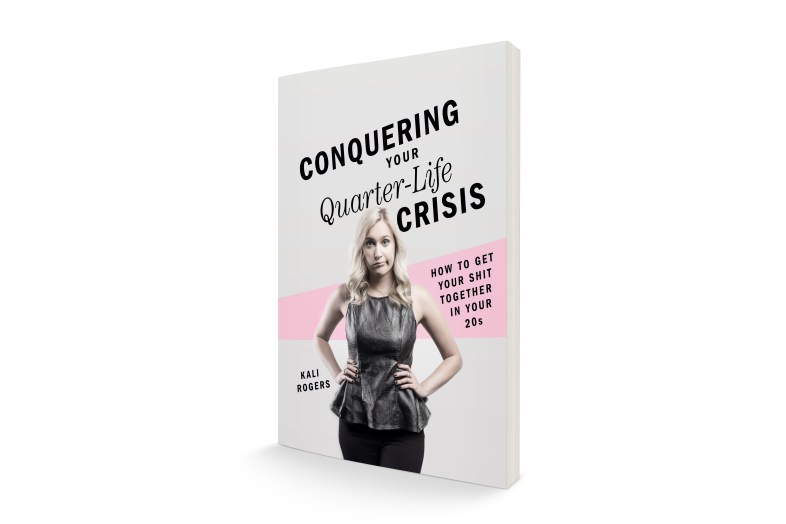
5 Signs You’re In A Completely Toxic Friendship (And It’s Time To See Yourself Out)

Pro Tip: Not all friendships are meant to last.
You are who your friends are. In fact, according to Jim Rohn (someone way smarter than me), we are the average of the five people we spend the most time with.
See! I’m not the only one who preaches about this stuff.
Now this could be a good thing or a bad thing – depending on your current state of relationships and if you are a pro at being able to pin point when it’s time to phase out a friendship. But even if you are in prime form and love everybody in your life – you STILL have to be cognizant of the fact that friendships change, circumstances change, and people change. If a friendship does not allow you to be your full care-free self, then it’s not doing anyone any favors.
So here is how to tell when it’s time to phase out a friendship:
1. THEY ARE HOT/COLD WITH YOU
Anyone who uses their attention and warmth as a weapon automatically have a red flag across their face. You can spot this easily by tracking if they treat you in unpredictable ways. Do you ever know what to expect when you show up? Are you a little squeamish due to your last encounter? Do you feel yourself getting nervous, wondering if they’re going to be mad again for no reason?
Girlfriend, that is no way to live.
This finicky behavior is typically tied to their sensitive ego. Of course not all friends are going to be baring up rainbows 24/7 – everyone has their days – but these friends are truly calculated about when they turn their charm on, and when they turn it off. If you continually find yourself receiving the cold shoulder after a short disagreement, an awkward moment, or a vulnerable talk – please know that isn’t coincidence. That is manipulation.
You’ll also find that they really kick up the affection whenever they need it – not whenever you need it.
They might signal a sweet smile and loop you into conversation whenever they feel alienated. If their typical wingman isn’t making an appearance that night, you might get the number one slot due to circumstance. And they definitely turn up the heat whenever they want to make someone else feel like the odd man out.
Bottom line; this person isn’t your friend. You are a toy to be played with, and you have zero control over how you will be treated from day to day. Instead of rolling with the punches, take control and kindly (or not kindly) see this person out. Life is too unpredictable as it is to have to additionally worry about treatment from “friends.”
2. THEY CONSTANTLY NEED YOU BUT RARELY RECIPROCATE.
One-sided friendships are the worst. They take up your psychic energy, drain your time, and eventually make you feel cornered. It’s nice to be needed, and it’s even better to be useful, but not at the expense of your self-care.
PSA: It’s not selfish to want to discuss your own issues or your daily happenings with a friend.
Balance is an essential function of friendship. Without it, the steam roll-ee will eventually feel bitter, resentful, and used.
Don’t freak out if your amazing friendship has suddenly shifted a bit to due to circumstance. Friendships to ebb and flow. Sometimes one of you will give more than you take. True friends adjust this balance depending on the context of life. But if this is a consistent pattern – one you can tell is not heading in a healthy direction – take caution. You do not have time in your life to manage your emotional needs AND a fellow adult’s emotional needs.
As one of my clients put it, “I can’t afford to take them on as a part time job.”
Friendships should enhance your life – not drain it.
(My clients are so brill.)
It’s easy to feel super guilty about letting a friendship like this one in particular go. And you have to admit, part of you probably enjoys the constant attention because…
1) it validates the stability of your life (WOW I am so glad my life isn’t that much of a hot mess.)
2) it helps you gain a more optimistic perspective about your own life choices (I might be an idiot but I’m not that much of an idiot!)
3) it entitles you to confidential information you might not otherwise know about (I’m the only one who knows?! I’m so freaking special!)
4) it makes you feel intelligent and needed (And she came to ME! I must be the best there is!)
I get it. As an baby life coach just trying to find her way in the world, I used to get myself into these situations all. the. time. But you know what? These friendships take a lot of work. That’s why people PAY ME NOW. It is an actual job to have one sided conversations constantly. I love it, but it’s work. And unless you want to start emailing invoices after lengthy text convos, I suggest you make a change now.
TL;DR: Never let your ego dictate your friendships.
Your friendships should not feel like a part time job, they should not feed your ego, and they should not drain your happy vibes. If you are sensing any of these being violated, let’s talk (but I am going to charge you).
3. YOU ENABLE THEM TO CONTINUE BAD BEHAVIORS
When you hear the term ‘codependent relationship,’ you’re probably thinking about something romantic. While it’s true that many co-dependent relationships are in fact between spouses, don’t disqualify platonic relationships from the equation.
Codependency is a relationship in which one person enables another person’s bad habits. They might cover up the behavior for them, normalize it, make excuses for it, or even encourage it to some extent. Plenty of friendships can be codependent – especially those one-sided friendships.
If you feel that you are an accessory for enabling a poor behavior in a friend, take a step back. Without your attention, what would happen? Would the behavior extinguish? Would they find someone else to be their enabler? Would they assume responsibility for their own actions and finally make a change?
Here are a few examples of co-dependent relationships just to give you a better feel:
*A friendship between an alcoholic and a party friend who supplies the beer and the bar hopping.
*A friendship between a complainer/“woe is me” type and an empathetic ear who always offers sympathy to encourage the helplessness.
(A friendship between a slacker and a doer who always finishes the project, cleans the house, or provides information so that the jobs still get done.
In each scenario, a bad behavior is being enabled instead of discouraged, because the second friend always manages to prevent whatever negative consequences the first friend should endure. We cannot confuse being a friend with being an enabler.
Friendships should exist between two adults who take care of their own responsibilities and their own emotional needs.
If one uses the other as a crutch, that isn’t a friendship. It’s co-dependency.
Again, it might feel cold and heartless to phase out this sort of friendship, but you aren’t doing your co-dependent friend any favors by staying in this dance. In fact, you are guaranteeing that this friend will have little to no motivation to actually make a change in their lives. Why would they when they have you to fix everything for them?
You don’t have to have a good reason to end a friendship, but this is certainly up there. Release yourself from guilt and walk away before you become so entrenched in this friendship that you can’t remember life prior to double the responsibilities.
4. THEY CONSTANTLY TALK POORLY ABOUT OTHERS
Rule of thumb: If they talk shit about others, they’re talking shit about you.
Everyone gossips. It is what it is. People like talking about other people – and not always in a hurtful sense. People will always be curious. So an occasional rip on a friend or a venting session is going to be a normal occurrence in any friendship. But again, like the rest of these signs, a PATTERN of negativity and spitefulness is not a good sign. Plus there is no way it can’t be rubbing off on you in some way.
Think about it. When your friend goes into a tirade about that bitch and a half Becky, do you stay silent? No, of course not. You probably chime in just to erase the awkward silence that would definitely develop had you stayed quiet. You come up with some rude thing to say about her to contribute to the conversation. But is that really you? Do you really think Becky is that much of a bitch? What if she just has a sassy attitude and strong opinions? Is that really so bad?? (Becky call me – we would get along.)
Remember how we started this blog – with the super smart quote from the super smart dude. We are the average of the five people we spend the most time with. So if you are spending time with someone who really isn’t nice to other people, statistics show that there’s a chance you won’t be, either.
Why take the risk?
If you really think you can stop this habit and have an honest conversation with this friend about tuning out the gossip, please do it.
It would be lovely if you could hold onto an otherwise healthy friendship. But if you know that distinguishing this behavior isn’t in the cards, think about the kind of person you want to be. Think about if you want unfair gossip circulating about you (it certainly is). Think about your own reputation. Think about the energy you are putting out into the universe. And really think about if this friendship is making you a better person.
5. THEY DON’T CARE ABOUT YOUR BEST INTERESTS.
This is also called being a bad influence.
There are a plethora of reasons why your friend might not have your best interest at heart. The two most common are
1) low self-esteem and,
2) the fact that misery SERIOUSLY does love company.
If your friend tries to pick fights between you and others, encourages you to go out on week nights with complete disregard for your day tomorrow, poo-poos life events and anything you are genuinely excited about, discourages you from challenging yourself, or feels intimidated by any of your successes, this person does not have your best interest at heart.
This might be tough, I know, because at one point, there was something tying you two together. Maybe you both got dumped at the same time and could commiserate over how awful it was. Perhaps you both HATED work because your boss was a complete moron who made your lives agonizing. Or maybe you both moved to a new city right after college and took full advantage of the bar scene.
But then…you started dating again. You got a promotion. You grew out of it. Whatever shifted now makes this friend super uncomfortable, and frankly they haven’t been supportive.
Get. Out.
Again – most friendships are not meant to last. I hope this isn’t coming across as too cynical, but I am pretty confident with this assessment after working with client after client in the same predicament.
A lot of friendships serve a purpose, and once that purpose expires, so does the friendship.
If it’s any consolation, these friendships weren’t built on mutual values or a deep and secure affinity for each other. They were probably loosely formed thanks to one similar commonality or pure convenience. And now, one or both of those factors doesn’t factor in anymore. No biggie.
Shedding friendships that don’t serve your best interests is one of the best things you can do for your self-esteem, motivation, and direction. If you have a game plan for life, you need people cheering you on every step of the way. And I have a feeling you’d be a great cheerleader in return. So give yourself that opportunity and phase out friendships that don’t meet your needs.
It’s not selfish – it’s healthy. ![]()












